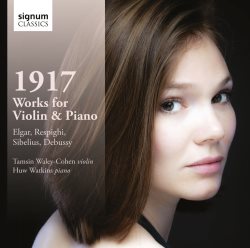| 
|
1917
Claude DEBUSSY (1862-1918)
Violin Sonata in G minor, L140 (1916-17) [14:31]
Ottorino RESPIGHI (1879-1936)
Violin Sonata in B minor, P110 (1917) [27:06]
Jean SIBELIUS (1865-1957)
Five Pieces for violin and piano, Op.81 (1915-18) [16:57]
Edward ELGAR (1857-1934)
Violin Sonata in E minor, Op.82 (1918) [26:37]
Tamsin Waley-Cohen (violin)
Huw Watkins (piano)
rec. November 2013, St George’s Church, Brandon Hill, Bristol
SIGNUM CLASSICS SIGCD376 [41:40 + 43:29]
1917 is the date that largely covers the composition of these works. The finicky might point to small discrepancies but surely only the pedantic could possibly complain. The concept however gives an opportunity to listen to three major sonatas from the time and Sibelius’s altogether unserious Five Pieces, Op.81 which seem to act as a kind of scherzo for the surrounding work’s intensities.
Each of the three sonatas receives a strongly personalised reading. The Elgar feeds on the often very strong contrasts between power and refinement that Tamsin Waley-Cohen and Huw Watkins find in it. Canny and sensitive dynamics ensure that phrasing is kept alive and some of passagework, which others make sound merely mechanical, is here alert and well characterised. The proportions, though not necessarily the interpretation as a whole, remind me of Tasmin Little’s recording but Waley-Cohen’s tone is not as large as Little’s and she is more inclined to stress the feminine qualities of the music. This is especially true in the slow movement, which is taken with decided inwardness, but warmed by the violinist’s sweet, chaste tone. In all this Huw Watkins is a more than equal partner, and he is always worth listening to in this repertoire, as he shows in the series of British cello sonatas he is recording with this brother on Chandos. His cultivation of some spectral sonorities in the finale is especially noteworthy, and neither he nor Waley-Cohen indulge the reminiscence of the second movement theme toward the end of the work, and that’s all to the good. So, this is a very interesting reading, with a strong point of view, more than usually weighted to the feminine perspective.
Debussy’s Sonata is taken rather in the modern manner, and so it just misses that element of vitality and quicksilver that animates those great historic performances of Dubois and Maas, and Francescatti and Casadesus. Partly this is a matter of tempo – all modern performances are slower – but it’s as much to do with the rapid alternation of expressive material in this sonata. Still, this is another engaging performance – elegant, refined, and not overwrought. Once more dynamics are very much an important element of the success of the recording and whilst I rather miss the sense of the ‘fantastique’ in the slow movement and true zest in the finale, the performance works well on its own terms. Respighi’s Sonata, as I’ve written elsewhere, has never had it so good on disc. The best performances are, structurally speaking, the tightest, where the chromaticisms and Franckisms are not allowed to provoke the ear. This reading avoids too much distension, and is well shaped. Here I feel that Watkins draws the ear even more than Waley-Cohen and he brings a real sense of colour and imagination to the performance – virtuosity too, because, like the Franck Violin Sonata, much of the burden in the Respighi falls on the pianist. It’s another recommendable performance, not as concertante-like as some, and not as brisk, too – certainly not in relation to Suk, and to Heifetz, prominently. The Sibelius pieces are charming, wistful and very light. They bring an elegant simplicity to the recital.
It’s a little unfortunate that the total timing (85 minutes) means that recording is split across two discs, though I see that it’s, rightly, priced ‘as for one’. The balance in St George’s, Bristol is very good and the concept worthwhile. The performances, as noted, are sensitive, characterful and present a strong point of view. I enjoyed them very much, even if my preferences ultimately lie elsewhere.
Jonathan Woolf
 |
 |
|











